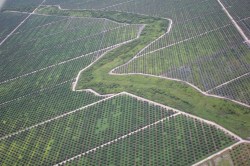Two new studies that came out in Europe during the last couple of days show that biofuel mandates are causing consumers far more pocketbook pain – and contributing more to deforestation and climate pollution – than even previous studies suggested.
The European Union’s own Joint Research Center found that Europe’s biofuels mandates are dramatically driving up food prices. Here’s the summary from Euractiv:
If biofuels received no EU policy support, the price of food stuffs such as vegetable oil would be 50% lower in Europe by 2020 than at present – and 15% lower elsewhere in the world – according to new research by the EU’s Joint Research Centre (JRC)….
When more soy and palm oil are used for biofuels production, less is available for food use and the resulting scarcity drives food price inflation.
“Given that more than half of the vegetable oils are used for biodiesel production in the base (business as usual scenario) in 2020, any decrease in biodiesel production strongly affects the vegetable oil market,” the JRC study says.
Under the EU’s proposed cap on first generation biofuels, vegetable oil use for biodiesel would be 28% lower than in a business as usual scenario. And if the biofuels policy were scrapped, the decrease could reach 75%.
As if the cost to consumers wasn’t bad enough, another study from the respected International Institute for Sustainable Development was published today showing that EU biofuels policy is causing Europe to use far more palm oil than anyone possibly imagined, a whopping 365 percent increase in palm oil biofuels use in the last six years.
As readers of this blog know, palm oil is an incredibly environmentally destructive commodity. Though some forward-looking companies are moving to deforestation-free production and a traceable supply chain, the vast majority of palm oil is produced the old-fashioned way: by cutting down rainforests and ultra-carbon rich peatlands to make room for monoculture palm plantations. Deforestation for palm oil is the main reason Indonesia, the world’s largest producer, is also the world’s third largest global warming polluter, behind only China and the United States.
The bitter irony, of course, is that a biofuels mandate sold as pro-environment is directly causing rainforest destruction. The studies come out just days before the European Parliament is scheduled to vote on a proposal to cap use of edible oils in biofuels and consider whether or not to count all the deforestation caused by palm oil and other commodities when assessing the impact of their biofuels policies (a process known as indirect land-use change or ILUC).
This should be a lesson for the US EPA

Aaron FishmanPalm oil plantation in Indonesia, recently planted on deforested land.
, which is continuing to consider whether or not to allow palm oil biodiesel to qualify for the US biofuel mandate, the Renewable Fuel Standard. As these new studies make clear, doing so would only exacerbate the problem:
As we’ve discussed before, you can’t increase palm oil use 365 percent and pretend that your policy isn’t dramatically worsening deforestation and climate change. It’s hard enough to protect rainforests with the EU’s biodiesel mandate; it’s hard to imagine many surviving the additional pressure that would come from burning palm oil in American engines as well.
This post was co-authored by Joel Finkelstein.
